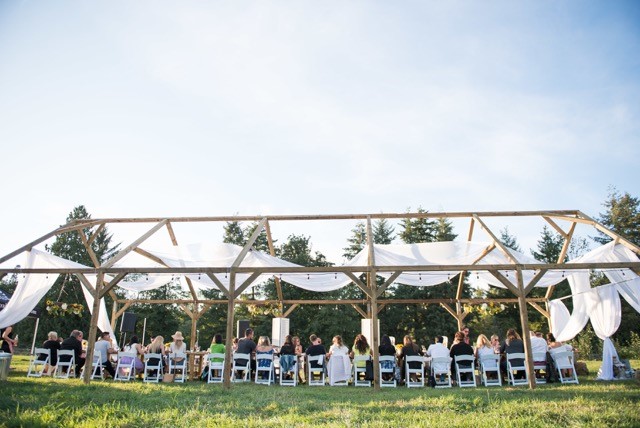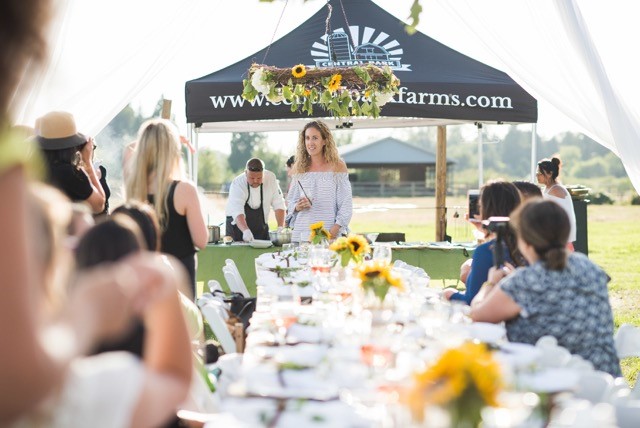It’s possible that in the relatively short history of industrialized food, we know the most we ever have about how the literal sausage is made. Information about factory farming is a click away, and the how and what of food consumption is considered base knowledge for the savvy consumer. But what if you find out all there is to know about industrial farming and decide you want nothing to do with it? Depending on who you ask, there are different options. You can go vegan or vegetarian; you can purchase meat from ethical sources; or, like Langley’s Kendall Ballantine, you can start your own farm.
Ballantine took her first step towards raising livestock by falling in love with a farmer. “After picking his brain on all things farming, I realized I no longer felt confident that the food I was feeding our family was ethically- and sustainably-raised. So I convinced him to let me raise a few chickens for our family, but only if I raised enough to sell to friends and family to offset my costs,” she recalls. “The next day I got home from my corporate career to find 500 chicks in our barn. I was convinced I’d never sell them all and we’d be eating nothing but chicken for the rest of our lives, but the first day I sold 125.” As it turns out, she “wasn’t alone in the struggle to find humanely-raised meat in our community.”
Things progressed quickly for Ballantine and her family after that. Once she added four pigs to her chicken offerings, the endeavour outgrew just selling to friends and family. Word started to spread about the quality of her chicken, and soon Central Park Farms was born—and Ballantine switched careers from operations manager for a large shipping company to full-time independent farmer. Her property occupies the needed space for people who want to eat responsibly-farmed meat. Central Park’s offerings include non-GMO-fed pasture-raised chicken, pasture-raised pork, grass-fed beef, and fresh eggs from pasture-raised hens.
Ballantine is passionate about giving her consumers full access to every aspect of her farm. “I don’t believe in certifications on the farm, I believe in transparency,” she says. “We open the doors to the farm so our customers can see exactly where their food comes from, how it was raised.” She warns of “green washing” from many food marketers. “Consumers think they’re making ethical choices, but often these labels don’t mean what we think they do,” explains Ballantine. “Just because something is labelled ‘local’ doesn’t mean it’s ethically-raised; it can be a local factory farm.”
Central Park includes the necessary chicken, cattle, and pigs, but also mini donkeys, mini goats, cats, and horses. Each morning, Ballantine and her staff check on the animals to make sure they have food for the day. Central Park’s animals are fed through a food waste recovery program that saves the farm from using commercial feed, but is also a labour of love that requires passion to sort through discarded food. “Animal agriculture gets a bad rap for having a massive carbon footprint, but there are a growing number of small-scale farmers out there working to produce more carbon-neutral products,” says Ballantine. “You really don’t get a good grasp of just how much food goes into the garbage in our society until you’re unloading skid after skid and filling bin after bin with food that is so close to perfect.” The rest of her day is spent collecting, sorting, washing, and packaging eggs; working at farmers’ markets; and making deliveries to Lower Mainland restaurants that feature Central Park products.
Ballantine is looking to expand, and with the recent purchase of 160 acres in Rock Creek, the future is looking bright: the land will be the future home of her herd of Black Angus cattle. They’ve also added events to the mix, and regularly host long-table dinners. “Our goal is to help our community make ethical and sustainable food choices,” Ballantine says. “We pride ourselves on being small-scale, and will remain that way so we can guarantee the wellbeing of our animals.” Thanks to that goal, consumers can feel more confident in their meat choices, and ultimately in how they feed their families—just as Ballantine does.
Discover more of Vancouver’s Community.











